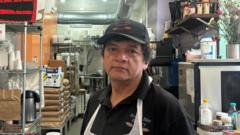The recent implementation of tariffs on imported coffee is reshaping the landscape for US café owners, leading to increased prices and changing consumer habits as businesses strive to maintain profitability.
Coffee Prices Surge As Tariffs Bite US Cafés

Coffee Prices Surge As Tariffs Bite US Cafés
Consumers brace for higher costs as coffee shop owners face tough choices amid tariff-induced price hikes.
---
The cost of coffee in the United States is on the rise following the introduction of tariffs that are putting pressure on café and bakery operators nationwide. The increase comes as many coffee lovers are already cutting back on their caffeine spending, causing longer lines for lattes to dwindle due to customers tightening their budgets.
Coffee is a massive market in America, with consumers shelling out around $100 billion (£76 billion) annually on this beloved beverage, a figure that may soon decline. Jorge Prudencio, owner of Bread Bite Bakery in Washington DC, has reported that his Colombian coffee distributor has raised prices in the wake of new tariffs enacted last week. The U.S., which ranks as the world's second-largest coffee importer, primarily sources its beans from Brazil and Colombia, according to the USDA.
Since April 5, a newly imposed 10% tariff on coffee imports from most countries has trickled down to businesses like Prudencio’s, who intends to raise prices for his customers just to keep pace with his supply costs. Speaking with the BBC, he expressed concerns about the lasting impact of these tariffs on sales.
Kamal Mortada, the manager of Au Lait café, shared a similar sentiment. He reported a notable decline in foot traffic as rising coffee prices deter customers. Ground coffee prices hit an unprecedented peak in March 2023, with average costs increasing more than a dollar since the previous year, pushing some patrons to switch their coffee orders to simpler options without extra ingredients. With a 25% menu price increase already in effect, many customers now opt for smaller sizes.
Over in San Francisco, Jenny Ngo from Telescope Coffee is grappling with the looming price hikes from her suppliers in Ethiopia and Guatemala, both of which are impacted by the new tariffs. She also noted a stark overnight increase in the cost of iced coffee cups imported from China. To stay afloat, she anticipates adjusting her prices yet again.
Despite these challenges, Prudencio remains optimistic, believing coffee will always draw customers. However, he also voiced concerns over escalating egg prices that have soared from $42 to over $100 within weeks—a situation exacerbated by external economic pressures and recent food supply issues.
In the bigger picture, Joel Finkelstein from Qualia Coffee Roasters in DC has been vigilant about the toll the recent tariff policies will take on his bottom line. He has already witnessed prior price fluctuations and anticipates further increases, which could lead to a downturn in sales.
As the unveiling of the tariffs unfolds, coffee shop owners across America are left to navigate a precarious path to maintain their businesses, while coffee-loving consumers brace for the impact on their daily brews.
The cost of coffee in the United States is on the rise following the introduction of tariffs that are putting pressure on café and bakery operators nationwide. The increase comes as many coffee lovers are already cutting back on their caffeine spending, causing longer lines for lattes to dwindle due to customers tightening their budgets.
Coffee is a massive market in America, with consumers shelling out around $100 billion (£76 billion) annually on this beloved beverage, a figure that may soon decline. Jorge Prudencio, owner of Bread Bite Bakery in Washington DC, has reported that his Colombian coffee distributor has raised prices in the wake of new tariffs enacted last week. The U.S., which ranks as the world's second-largest coffee importer, primarily sources its beans from Brazil and Colombia, according to the USDA.
Since April 5, a newly imposed 10% tariff on coffee imports from most countries has trickled down to businesses like Prudencio’s, who intends to raise prices for his customers just to keep pace with his supply costs. Speaking with the BBC, he expressed concerns about the lasting impact of these tariffs on sales.
Kamal Mortada, the manager of Au Lait café, shared a similar sentiment. He reported a notable decline in foot traffic as rising coffee prices deter customers. Ground coffee prices hit an unprecedented peak in March 2023, with average costs increasing more than a dollar since the previous year, pushing some patrons to switch their coffee orders to simpler options without extra ingredients. With a 25% menu price increase already in effect, many customers now opt for smaller sizes.
Over in San Francisco, Jenny Ngo from Telescope Coffee is grappling with the looming price hikes from her suppliers in Ethiopia and Guatemala, both of which are impacted by the new tariffs. She also noted a stark overnight increase in the cost of iced coffee cups imported from China. To stay afloat, she anticipates adjusting her prices yet again.
Despite these challenges, Prudencio remains optimistic, believing coffee will always draw customers. However, he also voiced concerns over escalating egg prices that have soared from $42 to over $100 within weeks—a situation exacerbated by external economic pressures and recent food supply issues.
In the bigger picture, Joel Finkelstein from Qualia Coffee Roasters in DC has been vigilant about the toll the recent tariff policies will take on his bottom line. He has already witnessed prior price fluctuations and anticipates further increases, which could lead to a downturn in sales.
As the unveiling of the tariffs unfolds, coffee shop owners across America are left to navigate a precarious path to maintain their businesses, while coffee-loving consumers brace for the impact on their daily brews.





















